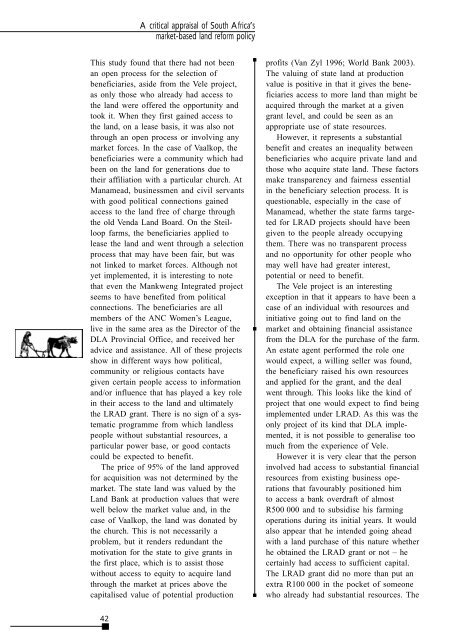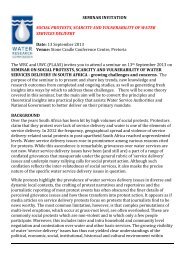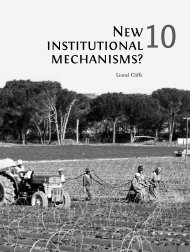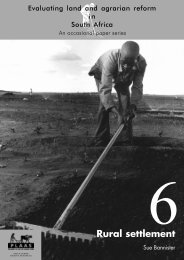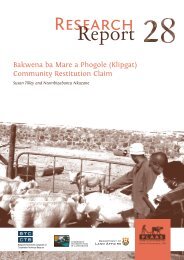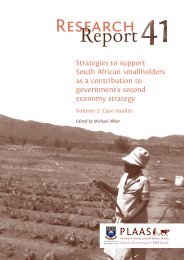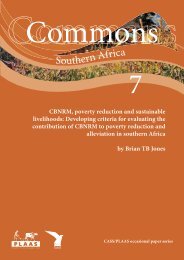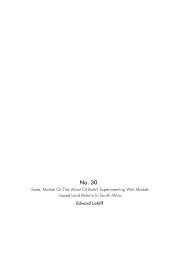A critical appraisal of South Africa's market-based land reform policy
A critical appraisal of South Africa's market-based land reform policy
A critical appraisal of South Africa's market-based land reform policy
Create successful ePaper yourself
Turn your PDF publications into a flip-book with our unique Google optimized e-Paper software.
A <strong>critical</strong> <strong>appraisal</strong> <strong>of</strong> <strong>South</strong> Africa’s<br />
<strong>market</strong>-<strong>based</strong> <strong>land</strong> <strong>reform</strong> <strong>policy</strong><br />
This study found that there had not been<br />
an open process for the selection <strong>of</strong><br />
beneficiaries, aside from the Vele project,<br />
as only those who already had access to<br />
the <strong>land</strong> were <strong>of</strong>fered the opportunity and<br />
took it. When they first gained access to<br />
the <strong>land</strong>, on a lease basis, it was also not<br />
through an open process or involving any<br />
<strong>market</strong> forces. In the case <strong>of</strong> Vaalkop, the<br />
beneficiaries were a community which had<br />
been on the <strong>land</strong> for generations due to<br />
their affiliation with a particular church. At<br />
Manamead, businessmen and civil servants<br />
with good political connections gained<br />
access to the <strong>land</strong> free <strong>of</strong> charge through<br />
the old Venda Land Board. On the Steilloop<br />
farms, the beneficiaries applied to<br />
lease the <strong>land</strong> and went through a selection<br />
process that may have been fair, but was<br />
not linked to <strong>market</strong> forces. Although not<br />
yet implemented, it is interesting to note<br />
that even the Mankweng Integrated project<br />
seems to have benefited from political<br />
connections. The beneficiaries are all<br />
members <strong>of</strong> the ANC Women’s League,<br />
live in the same area as the Director <strong>of</strong> the<br />
DLA Provincial Office, and received her<br />
advice and assistance. All <strong>of</strong> these projects<br />
show in different ways how political,<br />
community or religious contacts have<br />
given certain people access to information<br />
and/or influence that has played a key role<br />
in their access to the <strong>land</strong> and ultimately<br />
the LRAD grant. There is no sign <strong>of</strong> a systematic<br />
programme from which <strong>land</strong>less<br />
people without substantial resources, a<br />
particular power base, or good contacts<br />
could be expected to benefit.<br />
The price <strong>of</strong> 95% <strong>of</strong> the <strong>land</strong> approved<br />
for acquisition was not determined by the<br />
<strong>market</strong>. The state <strong>land</strong> was valued by the<br />
Land Bank at production values that were<br />
well below the <strong>market</strong> value and, in the<br />
case <strong>of</strong> Vaalkop, the <strong>land</strong> was donated by<br />
the church. This is not necessarily a<br />
problem, but it renders redundant the<br />
motivation for the state to give grants in<br />
the first place, which is to assist those<br />
without access to equity to acquire <strong>land</strong><br />
through the <strong>market</strong> at prices above the<br />
capitalised value <strong>of</strong> potential production<br />
pr<strong>of</strong>its (Van Zyl 1996; World Bank 2003).<br />
The valuing <strong>of</strong> state <strong>land</strong> at production<br />
value is positive in that it gives the beneficiaries<br />
access to more <strong>land</strong> than might be<br />
acquired through the <strong>market</strong> at a given<br />
grant level, and could be seen as an<br />
appropriate use <strong>of</strong> state resources.<br />
However, it represents a substantial<br />
benefit and creates an inequality between<br />
beneficiaries who acquire private <strong>land</strong> and<br />
those who acquire state <strong>land</strong>. These factors<br />
make transparency and fairness essential<br />
in the beneficiary selection process. It is<br />
questionable, especially in the case <strong>of</strong><br />
Manamead, whether the state farms targeted<br />
for LRAD projects should have been<br />
given to the people already occupying<br />
them. There was no transparent process<br />
and no opportunity for other people who<br />
may well have had greater interest,<br />
potential or need to benefit.<br />
The Vele project is an interesting<br />
exception in that it appears to have been a<br />
case <strong>of</strong> an individual with resources and<br />
initiative going out to find <strong>land</strong> on the<br />
<strong>market</strong> and obtaining financial assistance<br />
from the DLA for the purchase <strong>of</strong> the farm.<br />
An estate agent performed the role one<br />
would expect, a willing seller was found,<br />
the beneficiary raised his own resources<br />
and applied for the grant, and the deal<br />
went through. This looks like the kind <strong>of</strong><br />
project that one would expect to find being<br />
implemented under LRAD. As this was the<br />
only project <strong>of</strong> its kind that DLA implemented,<br />
it is not possible to generalise too<br />
much from the experience <strong>of</strong> Vele.<br />
However it is very clear that the person<br />
involved had access to substantial financial<br />
resources from existing business operations<br />
that favourably positioned him<br />
to access a bank overdraft <strong>of</strong> almost<br />
R500 000 and to subsidise his farming<br />
operations during its initial years. It would<br />
also appear that he intended going ahead<br />
with a <strong>land</strong> purchase <strong>of</strong> this nature whether<br />
he obtained the LRAD grant or not – he<br />
certainly had access to sufficient capital.<br />
The LRAD grant did no more than put an<br />
extra R100 000 in the pocket <strong>of</strong> someone<br />
who already had substantial resources. The<br />
42


